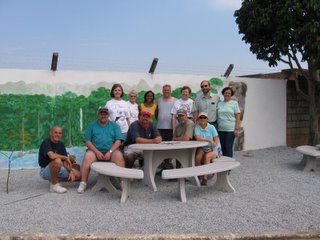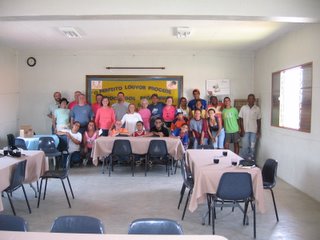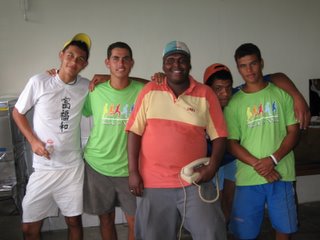I finally have a "home" and am sharing the apartment of a doctor/health administrator in Belo Horizonte who also volunteers for the church. Her daughters are grown and have moved away, and I am helping (?) to combat whatever empty nest syndrome she might have. Thanks to the work team from College Place United Methodist Church that came to Belo last week, I now have all of my stuff here with me, although a few things are still close by but in a location other than my apartment.
My first assignment was to help with the work team, staying with them in the rural hotel ("sitio") close to the Liberdade ("Freedom") community center, attempting rudimentary translation, and working alongside the team painting inside and outside, stringing new barbed wire, tying up bougainvillea, carting gravel and mixing cement for a new sidewalk. One highlight of our stay at the sitio was our Sunday service outside where the local dog (luckily the small, friendly one, not the larger junkyard one that was usually tied up) attended communion and one of the team members was baptized as birds built a nest in the background.
We also got to experience a worship/celebration service at the community center outside on the soccer court and learned a new game (badminton without the racquets). The work team brought with them toys and school supplies for the children, and by reaching deep into the recesses of my brain, I was able to remember how to play jacks in order to teach the kids.
The people working/volunteering at the Liberdade center are great. The youth, in particular, are a very animated bunch who love to tease and ask how to say things in English. Hopefully, I will be teaching a formal English class at some point. Lunch is served at the Liberdade center, and I am concerned about the potential effects of the delicious food on my physique.
Today, I went to the São Gabriel community center for the first time, meeting the staff, volunteers and children and serving as a guinea pig for the manicure class. For some reason, the idea of giving a pedicure to "American" feet was quite appealing, and I was temporarily a celebrity. I also attended a children´s music class and the weekly activity for the senior citizens. I will be working at both the São Gabriel and Liberdade community centers, so the next step is to learn how to take the bus to get to those neighborhoods.
Birthdays are a very big deal here, so in my 9 days in Belo Horizonte, I have already witnessed 3 birthday celebrations where the birthday song was sung (same tune as in the U.S.) and refreshments of some sort were served after the regularly scheduled activities. And speaking of birthdays, several streets here are named after historically significant dates, and I have already found a street with my birthday in my own neighborhood.
One huge difference between here and the U.S. is the much better utilization of space in houses, apartments, cars, etc. just as in Europe. Things are in much smaller portions here, including everything from glasses, milk/juice cartons to dishwashing liquid. I´m not sure what accounts for this apparent lack of hoarding, but it´s a very strange thing for me to leave the grocery store with enough food for only a few days (because everything is sold in much smaller packages, and the refrigerators and freezers are smaller as well).
In general, people are much more cordial or friendly than in the U.S., but there is still a distinction here between the city (where strangers don´t frequently speak) and the suburbs (where complete strangers will carry on entire conversations). Although I´ve been to Brazil before, it still takes some getting used to what I would describe as the "meat market on steroids." Men, in particular, spend a lot of time and energy appreciating the feminine form. For the first few seconds, this may feel flattering. After that, it begins to feel like you are a piece of meat walking down the street and that these "admirers" have x-ray vision. I had to make some mental adjustments to develop a virtual shield or coat of armor to deflect or ignore this unwanted attention. At least, according to my roommate, it is pretty much "look but don´t touch" and women are still safe walking alone (within reason).
I´m overdue for my dinner, which is more of a snack here because the main meal of the day is lunch, so I´ll stop here. Stay tuned for entering banks, local transportation and more...
 The work team from College Place United Methodist Church in Brunswick, Georgia plus translator Jeane and Gordon & Teca Greathouse (United Methodist Missionaries and coordinators of Volunteers in Mission for Brazil and my bosses). I am very grateful to the team for bringing me the rest of my clothes and possessions. The team is at the Liberdade Community Center in front of a mural painted by one of the team members, who is appropriately nicknamed "Art."
The work team from College Place United Methodist Church in Brunswick, Georgia plus translator Jeane and Gordon & Teca Greathouse (United Methodist Missionaries and coordinators of Volunteers in Mission for Brazil and my bosses). I am very grateful to the team for bringing me the rest of my clothes and possessions. The team is at the Liberdade Community Center in front of a mural painted by one of the team members, who is appropriately nicknamed "Art."  The College Place UMC work team and Liberdade staff and volunteers at the goodbye lunch.
The College Place UMC work team and Liberdade staff and volunteers at the goodbye lunch.
